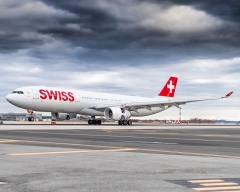Four Swiss cities in the top ten in Europe for cocaine use
The data is part of the latest wastewater analysis study produced by the European drug agency, the EMCDDA, and the wastewater analysis group SCORE.
The findings are based on analysis of wastewater in 73 cities in 20 European countries over a one-week period in March 2018 as part of an attempt to establish residents' drug use habits.
The data show an overall European increase in traces of cocaine in wastewater in line with the trend observed in the 2017 results.
They also show that Swiss cities continue to have remarkably high levels of cocaine use, although these cities don't appear as high on the charts as they did last year.
In Swiss cities, the use of cocaine and ecstasy certainly appears to have remained at high levels. New data on wastewater prove this. The analyzes and assessments of waste water in Switzerland were carried out by @unil and #Eawag. https://t.co/jkgfGK5qKb
- Eawag (@EawagResearch) March 14, 2019
Zurich ranked third in terms of daily use in the latest rankings, one place less than last year and now behind Bristol and Amsterdam.
Meanwhile, St. Gallen in eastern Switzerland ranked sixth (two places down from last year), Geneva in seventh (also two places down) and Basel in ninth (down one place).
The Swiss capital Bern was in 11th place, up from ninth last year.
Read also: Thousands of Swiss could get "cannabis license"
According to the wastewater analysis, Switzerland also continues to be at the top for ecstasy use with Zurich (3rd), St. Gallen (7th) and Geneva (8th) all in the top ten for everyday use. .
Discussing the importance of the findings, the EMCDDA notes that while "no single measure can provide a complete picture of the drug situation", wastewater analysis is a valuable part of the toolkit when it comes to establishing a picture of the drug situation. drug use habits.
The agency notes that this wastewater analysis is positive as it sidesteps the bias of drug addiction surveys. On the other hand, it is limited as it cannot provide information on factors such as the prevalence and frequency of use, the number of users, the types of users, and the purity of the medications being taken.
"More or less the same price as a cinema ticket"
A separate study published last year based on an extrapolation from cocaine use in the canton of Vaud suggested that around five tons of cocaine are consumed in Switzerland every year. That's 13.7 kg per day.
Franck Zobel, deputy director of Addiction Suisse - one of the organizations behind that study - noted that the price of cocaine had dropped from 300 to 500 Swiss francs per gram in the 1990s to around 100 francs (88 euros). This had made it affordable in price to many more people.
“Cocaine is not expensive. A line, whether it's 0.1 or 0.2 grams, comes in at around 15-20 Swiss francs, or roughly the same as a movie ticket, ”said Zobel.
The average salary in Zurich in 2016 was 7,820 francs, as shown by the figures published at the end of last year.

Comments to this:





